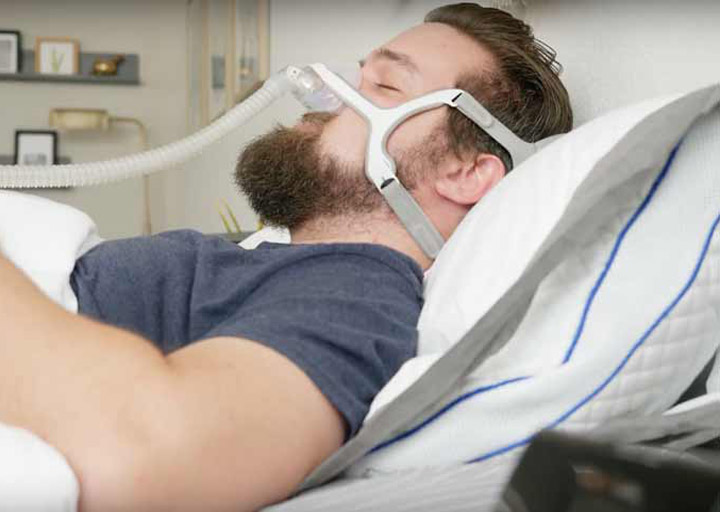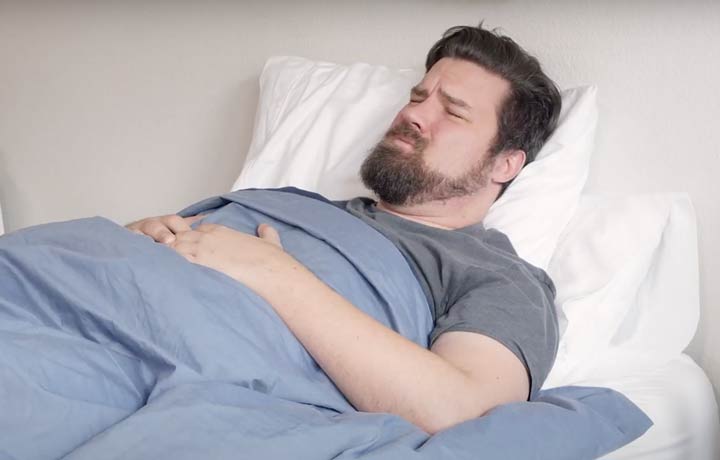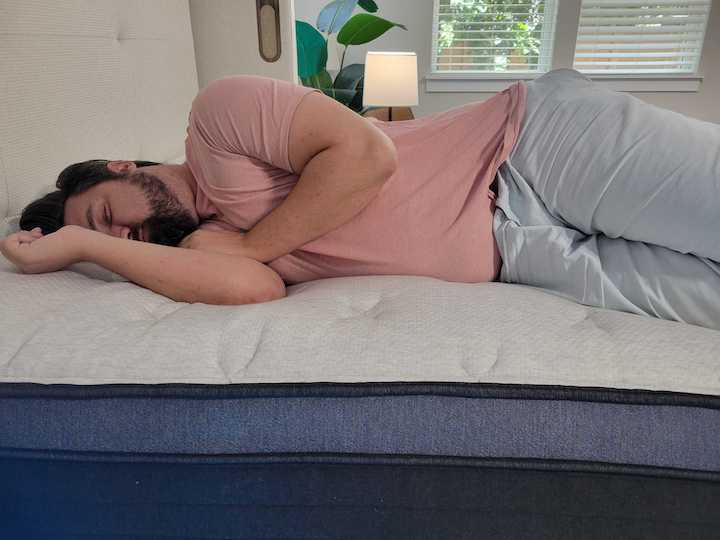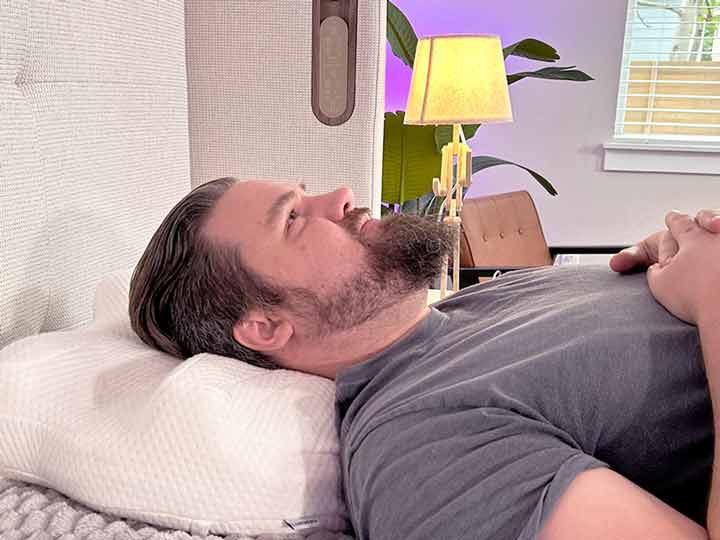While the health risks associated with obesity are well known, many people don’t consider the impact of obesity on sleep quality—or vice versa.
According to Dr. Kent Sasse, an MBSAQIP-accredited surgeon, “Increased body weight is associated with reporting of poor sleep by individuals in survey data, but that’s just the beginning.”
Here’s what to understand about obesity and sleep, including the relationship between the two, common sleep concerns for people who are overweight, and tips for improving sleep quality when you’re a person with obesity.
Sleep and Adult Obesity
“Obesity has significant negative effects on sleep in both adults and children,” Sasse tells Mattress Clarity. He says the body must work harder to expand the chest for adequate inhales and exhales, which can result in a condition called hypoventilation.
“The excess body fat also obstructs the airways in the throat, leading to loud snoring, pauses in breathing, and less overall oxygen to the brain, a condition known as sleep apnea.”
In addition to the physical issues it presents, says Sasse, some researchers believe the increase in systemic inflammation and the hormonal abnormalities of obesity also affect sleep quality. Combined, these issues impede the restful sleep that is so imperative for our physical and mental health. Without it, Sasse says people with obesity are left feeling fatigued during the day, more prone to headaches, and generally more irritable and less productive.
Sleep and Childhood Obesity
For children, the association between obesity and sleep quality is similar. Children need more sleep than adults to support their growth and development, and research shows that insufficient sleep is associated with an increased risk of becoming overweight or developing obesity.
Sasse notes that children with excessive body weight can experience the same physical challenges simply to expand the chest for adequate breath, a scenario that can lead to disruptive nights.
How Does Sleep Affect Weight?
While it’s true that overweight and people who have obesity are less likely to get a good night’s sleep, poor sleep itself can promote weight gain. In fact, chronic sleep loss is one of the risk factors for obesity.
“Good sleep is a big part of overall good health and part of successful maintenance of a healthy body weight,” says Sasse. “Impaired sleep has been found to be associated with loss of willpower and more indulgent eating, fatigue, reduced motivation to exercise, and weight gain.” It can be a vicious cycle.
Common Sleep Concerns for People With Obesity
Beyond health risks like heart disease and Type 2 diabetes, people who are overweight are more likely to experience specific conditions related to poor sleep.
Obstructive Sleep Apnea (OSA)
Obstructive sleep apnea, or OSA, is seven times more common in individuals with higher body weight, and it’s largely mechanical. Excess body fat can obstruct airways in the throat, which triggers loud snoring and lengthy pauses in breathing.

It’s a disruptive way to spend the night, but treatments like CPAP machines, oral appliance therapy, and some surgeries can correct OSA and restore sleep health. Lifestyle modifications can also improve sleep quality, and many people benefit from sleeping on their side. In some instances, mattress selection can play a role in improving OSA. Take a look at our list of the best mattresses for sleep apnea for some good options.
Acid Reflux
Acid reflux is a burning sensation in the middle of the chest that’s often felt after meals or when someone is lying down, but it can also be asymptomatic during the day. A more serious form of acid reflux, gastroesophageal reflux disease (GERD), can cause the same heartburn sensation but is a chronic condition that can lead to damage to the body or dental health over time.

Obesity is a known risk factor for GERD. Sasse explains the increased likelihood of acid reflux and GERD for people with obesity is based on “increased abdominal pressure, which forces stomach acid upward into the esophagus where it burns.”
Depression
Research shows that obesity is a risk factor for depression, and depression is a risk factor for obesity. What’s more, depression is linked to a higher incidence of sleep problems. Seventy-five percent of people with depression experience difficulties falling or staying asleep.

Asthma
Asthma, a respiratory condition related to inflammation in the airway, is more common in those with obesity. According to Sasse, the increased risk of asthma relates to “the hormonal abnormalities of obesity, which include increased inflammation throughout the body, abnormal chemistry that drives increased blood sugar, increased blood pressure, changes in brain chemistry and mental stress.” Asthma symptoms also tend to be worse at night, impeding sleep.
Osteoarthritis
This is another mechanically-based side effect of obesity. “Increased body weight creates more wear and tear—i.e., arthritis—on weight-bearing joints,” says Sasse.
How To Get Better Sleep If You’re Obese
There are steps you can take to improve sleep quality and duration if you’re overweight. Here’s what to consider.
Find a Supportive Mattress
A supportive mattress ensures proper spinal alignment so you can rest comfortably all night. Bigger bodies need a mattress that’s specifically designed for ample support now and into the future, so it’s worth investing in one of the best mattresses for heavy people. These mattresses are constructed with stronger coils and denser materials to reduce the likelihood of premature sagging.

Get the Right Pillow
Pillows are best chosen based on body size and sleep position, so the best pillows can really vary. Regardless, the key is finding a pillow that keeps your neck aligned, however you choose to sleep.

Someone with a bigger body who sleeps on their side, for example, will do best with a high loft pillow that supports alignment of the spine in the neck and upper back. A back sleeper needs a pillow with a lower loft to avoid pressing the head up or letting it drop down. Hugging a body pillow may be helpful for supporting the torso, hips, and knees.
Consider an Adjustable Base
For sleepers who have sleep apnea or acid reflux, an adjustable base can be incredibly helpful. The best adjustable bed bases give you the freedom to elevate the head of the bed, which can keep stomach contents down and alleviate snoring
Improve Your Sleep Hygiene
Sleep hygiene, or practices designed to support consistent and high-quality sleep, is another important consideration. Creating a restful wind-down routine, following regular bed and wake times, making the bedroom conducive to sleep by keeping it dark, quiet and cool, and stopping eating 3 hours or more before bedtime, can help ensure you get good quality sleep night after night.
FAQs
Can obesity cause sleepiness and fatigue?
“Yes, obesity is most definitely associated with increased sleepiness and fatigue, even independent of sleep apnea,” says Dr. Kent Sasse, an MBSAQIP-accredited surgeon. Excess body weight can make the act of breathing harder, and it’s also associated with hormonal imbalances and inflammation, all of which can interfere with good sleep quality and lead to daytime sleepiness.
How should you sleep if you’re overweight?
Best practices for sleep, or good sleep hygiene, apply regardless of weight. “These include avoiding alcohol, getting regular exercise, going to bed and waking up at the same time every day, cooling down your bedroom, and making sure the bedroom is dark and focused on rest,” says Dr. Kent Sasse.
Obese individuals in particular likely benefit from supportive mattresses made with memory foam, which conform to the body and help reduce pressure. Sassse also notes that side sleeping may promote better airflow, and elevating the head of the bed can be beneficial for those with severe acid reflux.
Will losing weight help me sleep better?
People who are overweight or obese and experiencing sleep issues are advised to lose weight to improve sleep quality, among many other benefits.
Resolution of OSA should be confirmed with sleep testing after significant weight loss in order to avoid the vulnerability of weight regain due to untreated sleep apnea.


